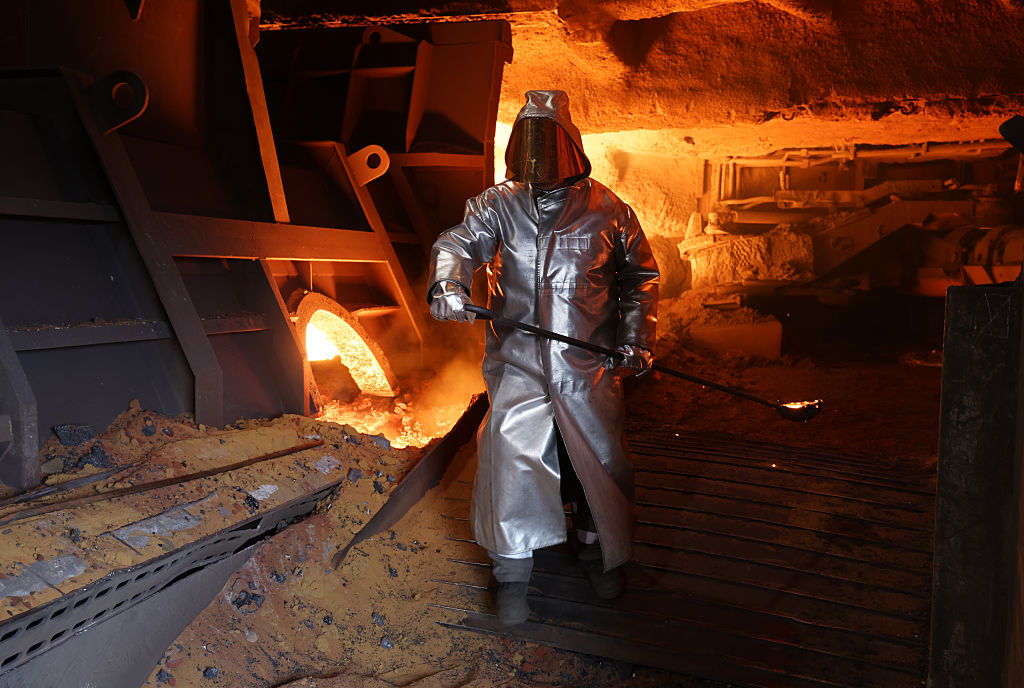Csaba Lantos, Hungary’s Minister for Energy, tells Brussels Signal that plans by the EU for a full embargo on Russian energy will lead to a price explosion across the continent.
Here is a diagnosis of the fluctuation of international gas prices. It comes from the Draghi Report, that is, from the official guideline of the European Commission. I could not myself have been able to say it any more succinctly:
“It has cost Europe more than a year’s worth of GDP growth that, due to the removal of cheap Russian gas, it has been compelled to invest an enormous amount of funds in energy subsidies and the development of the infrastructure serving LNG imports. While European prices have descended from the historical peaks experienced during the international energy crisis, our businesses pay two to three times more for electricity and four to five times more for gas than businesses in the United States on a long-term basis. High energy costs – preventing investments – are curbing growth; the performance of energy-intensive sectors has fallen by 10 to 15 per cent since 2021. Without the meaningful development of production and network capacities, the efforts aimed at digitisation and green transition in transport, too, are coming up against obstacles.”
Observing the fluctuations of international prices and their relative proportions, the above diagnosis from the Draghi Report is accurate. It is a fair assessment of the situation. It was based on these findings that during the rotating Hungarian presidency in 2024, we adopted the Budapest Declaration in full agreement. In the document, we jointly laid down that during the realisation of our energy sovereignty and climate neutrality goals, the supply of every European citizen and business with affordable and clean energy was a top priority. We committed to adopting urgent measures also with a view to managing the situation arising from high and fluctuating electricity prices.
After a hopeful start, however, we were not allowed to remain hopeful for long, regrettably. We are waiting to this day in vain for specific and forwarding-looking proposals for the elimination, or at least reduction, of our competitive disadvantage. By contrast, at the beginning of May, the European Commission issued a timetable for multiple years about how to keep running, with our heads down, to the very end of a dead-end street, instead of finding a way out. The first draft legislation, too, has recently been released, confirming their intention to ban Russian gas imports by the beginning of 2027, at the latest.
Beyond its evident price-boosting effect and the resulting supply security risks, the plan on a full Russian energy embargo means that we also voluntarily abandon even the slightest chance of gradually eliminating our disadvantage in competitiveness. The solution now opted for is contrary to the EU’s fundamental principles, while the unilateral abandonment of an energy source also goes against all Commission policy expectations forcefully declared so far. By wrapping the latest sanction decision in a trade policy disguise, they are practically removing the Member States’ veto. They’re depriving twenty-several Member States in one fell swoop of the possibility of determining their energy mix within national competence. While until today, the declared goal was to increase the number of suppliers and routes, now they’re planning to unilaterally surrender the closest ample source. It seems that those who had so far ardently advocated for the supremacy of the green ideology are now not in the least bothered by the environmental impact which results from the lengthy shipping of gas coming from the other side of the ocean.
Hungary’s external energy bill increased from €7 billion in 2021 to €17 billion in 2022. It was only last year that we reached a point where the import-export balance of energy carriers was again at a level on a par with the pre-energy crisis level. Due to the embargo threats, we are preparing for another price explosion. Let’s just take the gas market where Russian supplies accounted for a fifth of European imports even at the beginning of last year. According to the logic of economics, a drastic decrease in supply necessarily results in a rise in costs. Naturally, LNG could cover a higher percentage of Member State needs than at present, but the real question is how much it would cost. In this case, one is required to pay not just for the molecules themselves; there is also the cost of liquefication and regasification, while in addition to the expense of shipping, one must also foot the bill for registration, pipeline usage and transit fees. The extra costs of crude oil procurements coming from as yet uncertain sources further add to these additional burdens. According to our calculations, the loss of Russian supplies would increase the costs of Hungarian families and businesses by around €2 billion a year.
We have so far managed to protect households even against the extreme price fluctuations experienced in recent years with the unique facility – in Europe – of “the reduction of household energy bills.” As Eurostat itself is continually compelled to demonstrate, Hungarian household consumers have access to natural gas and electricity at the lowest prices. The budget is contributing to the reduction of their burdens with €2 billion both this year and next year. Thanks to this measure, in Hungary, the percentage of people who have problems heating their homes is less than half of the EU average. The reduction of household energy bills has enabled us to fight against energy poverty in an exemplary manner, but the planned embargo would take this instrument, too, away from us. According to our calculations, in the absence of the protection of household energy bills, Hungarian families would have to pay twice as much for electricity and four times as much for gas. We cannot allow this to happen under any circumstances; we will fight against the plan curtailing rights and pushing prices up with all available means and in every possible way.
Despite all unfair accusations, we are ready and able to take action with a view to strengthening our energy sovereignty. Compared with the pre-energy crisis level, we have cut natural gas consumption by a quarter. Last year and also the year before, domestic exploitation accounted for more than a fifth of the annual consumption of 8.5 billion cubic metres. We additionally concluded multiple agreements with Azeri, Qatari and Turkish partners about gas supplies. On the Croatian LNG terminal, we have reserved a capacity of 1 billion cubic metres which we would be happy to increase once the infrastructure conditions are in place. The national energy company MVM acquired a share in one of the world’s largest undersea gas fields.
Meanwhile, in Hungary, the performance of solar panels has expanded at an unprecedented rate in recent years. Our solar power plants now account for a quarter of our domestic power generation; there is no higher percentage than this anywhere in the world. Combined with our nuclear power plant blocks, we are often able to export carbon-free power. Compared with 1990, the country’s net greenhouse gas emissions have decreased by 47 per cent; we are doing well in achieving the 55 per cent goal set for 2030 in the Fit for 55 package.
In other words, Hungary is making every effort to reduce its import exposure, and to hand over the created world to future generations in a liveable form. However, it would be useful to receive some help on this matter from the European Commission as well, or to achieve at the very least that their energy policy measures should not hinder, prevent, frustrate Member State efforts. It is clear what is at stake: we will keep on fighting with all our might for the competitiveness of the European economy and the reduction of the burdens of families and businesses. We would expect some discretion, more long-term thinking, and rational decisions from the EU’s leading bodies – for the purposes of which both the Draghi Report and the Budapest Declaration would provide ample munition.





Dollars and the old clerical flaws: does Leo XIV have questions to answer?